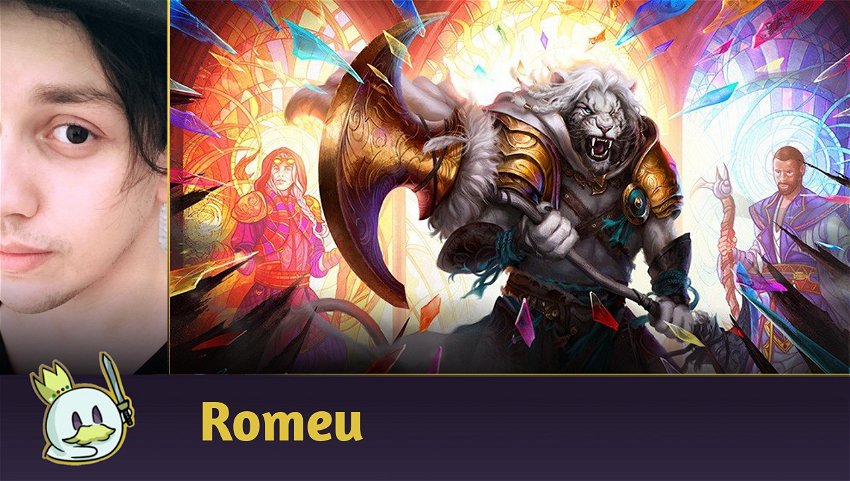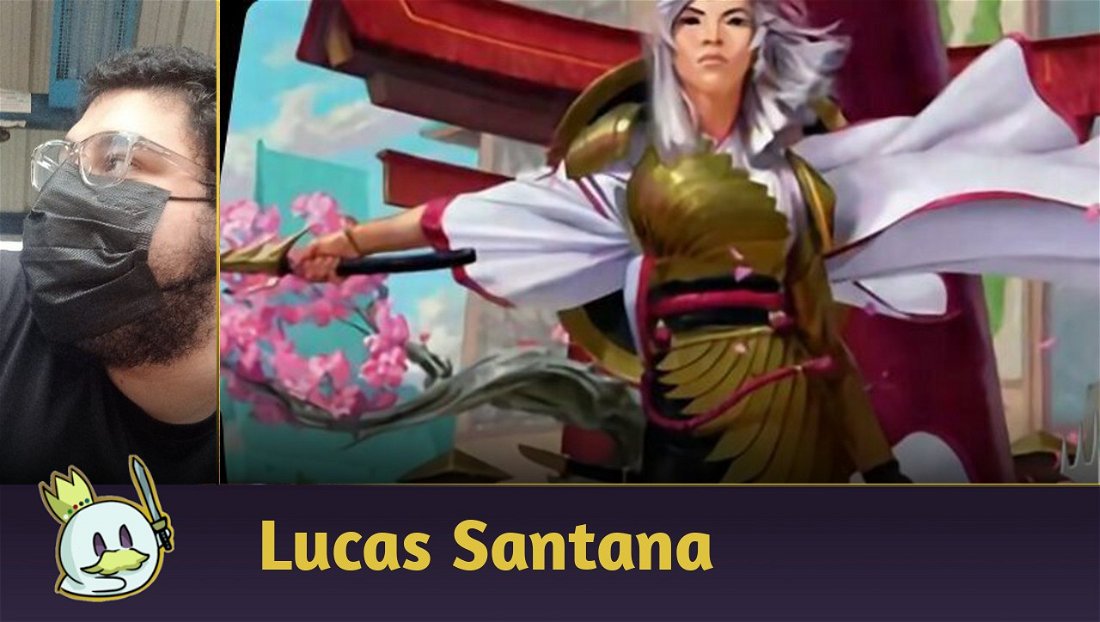With the first previews of Dominaria United surfacing last week, we're abruptly reminded that rotation is getting closer - as of its release, Zendikar Rising, Kaldheim, Strixhaven and Adventures in the Forgotten Realms will no longer be legal in Standard, and will tear apart some main archetypes present in the format today.

Ad
Among the biggest losses, we have the Pathways, which worked as great dual lands where they not only allowed a good amount of splashes and a good balance of three-color manabase, but also rewarded or punished players for their decisions based on color requirement in the short to medium term — and duals coming into play untapped at any stage of the game are extremely rare to arise.
So, we can expect a slowdown in the three-color archetypes in the future Standard if we don't have an equivalent replacement in Dominaria United, which, I think, is unlikely unless they decide to reprint the Painlands — last seen in Magic Origins — as they indicate locations of this plane in their names (and it would be awesome to finally have the full cycle on Pioneer).

Speaking of speed and versatility, another huge loss will be the Manlands, as they added yet another angle of attack to the main decks of the format and mitigated the factor of any land becoming a bad topdeck. The same can be said of Zendikar Rising's Spell Lands, especially Jwari Disruption, Emeria's Call and Shatterskull Smashing.

Several other staples or important spells will also be leaving, and this will obviously cause tons of changes, and new structures need to be reworked to create and establish a new Metagame.
Of course, the arrival of Dominaria United and the release of The Brothers War a short time later will shake up and define much of how the 2023 Standard will behave, but we can evaluate based on the strategies present this season which archetypes currently exist may continue to, and even be competitively viable in this new cycle, so let's look at each of the most played decks today and what their chances of post-rotation survival are.
I'll be breaking them down into two categories: those that are likely to disappear from September onwards, and those that are still viable after rotation, and I'll do an individual analysis of what they need to remain as viable strategies next season.
Decks that will most likely disappear with the Rotation
Jeskai Hinata
Loses with Rotation: Magma Opus, Goldspan Dragon, Expressive Iteration, Manabase.
Needs: Multi-target spells.
Many people hate Jeskai Hinata for being too close to a broken deck, so I suppose few will truly miss playing against it.
What makes Jeskai Hinata so powerful is the interplay between its winconditions: Magma Opus, Hinata, Dawn-Crowned and Goldspan Dragon — as everyone who has faced it knows, the ability to make Opus an explosive spell for two or three mana is absurd, and it's incredibly easy to protect Goldspan Dragon with Treasure tokens.
With all these cards gone, plus a manabase that doesn't reward three-color enemy decks as much with the absence of the Triomes, Jeskai Hinata will need a pretty big overhaul to still exist in Standard and will rely exclusively on lands that allow for better consistency, alongside multi-target spells.
Ad
That said, Hinata, Dawn-Crowned is a decent threat on its own and makes all of your spells better: A Lightning Strike — if it ever exists in Standard — becomes a Lightning Bolt in her presence, a Make Disappear becomes a Force Spike on steroids and so on. So, I still believe that Hinata can play as a decent midrange next season if the manabase allows it, but no longer with the almost broken interaction with Magma Opus.
Mono-Green Aggro
Loses with rotation: Old-Growth Troll, Werewolf Pack Leader, Blizzard Brawl, Esika's Chariot, Ranger Class, Snakeskin Veil, Inscription of Abundance, Lair of the Hydra.
Needs: Two-for-one threats, cheap proactive interaction.
Mono-Green Aggro will lose practically everything that constitutes its core when Dominaria United comes out.
While there are some functional replacements for some cards, such as Primal Adversary and Jewel Thief, I'm guessing that the absence of some key spells and especially the interactions between its permanents and low-cost interactions that offer protection and /or removal make the "Aggro" proposal less viable.
It's possible that with the existence of new mana dorks, Mono-Green could raise the curve to play better threats at a higher cost, but I am not convinced that will make it any better or more consistent than a midrange with two or more colors and won't be enough to supply the need to invalidate 1-for-1 removals as the current version does.
Mono White Aggro
Loses with rotation: Usher of the Fallen, Luminarch Aspirant, Skyclave Apparition, Elite Spellbinder, Legion Angel, Manlands.
Needs: Low-cost creatures that offer either quality or disruption.
If Mono-Green is in a bad spot after the rotation, I believe Mono-White Aggro is even worse without some essential key pieces: Luminarch Aspirant increases the clock, Elite Spellbinder delays the opponent for several turns and Legion Angel alongside the manlands made it possible to extend its game.
Without these elements, Mono-White will need more quality creatures for a low cost — something that doesn't normally come pre-set in a single release — to keep up in the competitive landscape, and the absence of two-for-one threats makes it an easy target for the Midranges.
Naya Runes
Loses with rotation: Runeforge Champion, Showdown of the Skalds, Runes, Pathways
Needs: Cheap, functional Auras and/or a change in strategy around Hallowed Haunting.
Not only does Naya Runes lose all of its core with Runeforge Champion and the Runes, it also loses its alternative card advantage engine, Showdown of the Skalds. So, it's safe to say that this deck will be dead after rotation.
What we might consider, however, is that Generous Visitor, Kami of Transience, Jukai Naturalist and Hallowed Haunting will remain in the format. Therefore, another variant geared towards midrange and with quality enchantments like Fable of the Mirror-Breaker can open up new interactions if the next sets put some emphasis on this permanent type.
Ad
Orzhov Control/Midrange
Loses with rotation: Luminarch Aspirant, Vanishing Verse, Legion Angel, Lolth, Spider Queen, Deadly Dispute, Eyetwitch, Shambling Ghast, Manlands.
Needs: A new early game base and/or good Control payoffs.
Orzhov has returned to being among Standard's main competitors lately after adopting a more proactive stance than previous versions.
However, much of the Orzhov core will leave Standard in September, and it will need to reinvent itself. While I don't doubt the likelihood of it being in the competitive scene next season, most of its cards will be essentially different from what we see today, especially in the early turns because its late-game can still be well established with The Wandering Emperor and Sorin the Mirthless.
Evolved Sleeper is a good start in this regard, and we also have Tenacious Underdog, but Orzhov as we know it today will definitely cease to exist and the doubt I have is if it will really be worth playing with two colors instead of going the Esper route — and we won't have the answer until we know if the next rotation's manabase will support three-color decks.
However, Orzhov Control, which loses Lolth, Spider Queen and Legion Angel as main threats will cease to exist, and we will need payoffs as good as they are — in addition to very efficient answers — to succeed in the format. So, I'm leaving it in this category.
Decks that might survive the Rotation
Boros Aggro
Loses with rotation: Luminarch Aspirant, Roil Eruption, Showdown of the Skalds, Elite Spellbinder
Needs: A cheap threats interacts with +1/+1 counters, cheap damage spell.
If I had to pick a deck from this season to play in the next, it would probably be Boros Aggro because it retains a lot of what really makes up its foundation.
The significant loss of Luminarch Aspirant was making me skeptical about the viability of this strategy after rotation, but Shivan Devastator made me more optimistic, as it offers a flexible and very explosive late-game drop which also interacts remarkably well with Thundering Raiju.
This brings us, therefore, to the remaining problem: a cheap damage spell similar to Roil Eruption — Boros Aggro can replace it with Kami's Flare, but it will never be as good a topdeck as a burn spell when pressuring the opponent and/or when we have an empty board.
I believe it's unlikely that we won't have a functional replacement between Dominaria United and The Brothers War (preferably, Lightning Strike itself), so I'm pretty optimistic about Boros Aggro's future in the 2023 Standard.
Esper Midrange
Loses with rotation: Luminarch Aspirant, Vanishing Verse, Legion Angel, Manabase
Needs: Good duals in Dominaria United.
Like Orzhov, Esper loses some of its lower cost drops, but the biggest damage from my point of view will be in its manabase where the absence of Pathways could hinder it.
Ad
That said, I think the Esper is much more viable in its current composition than an Orzhov as Raffine, Scheming Seer is insanely powerful and offers massive card filtering, making it the perfect payoff for adding blue to a black and white base.
Other pieces that would justify the splash or addition to blue include Kaito Shizuki and Obscura Interceptor, not to mention cheap interactions like Make Disappear, and even cards like Dennick, Pious Apprentice could be useful low-cost drops for the list.
Therefore, I'm optimistic that we'll have a manabase that supports Esper Midrange — and even make it the best deck in the format — in the next release.
Vampires
Loses with rotation: Stable Manabase, Expressive Iteration
Needs: Good duals in Dominaria United.
Basically, Vampires' core remains intact in Standard after rotation, except for its manabase, and this can bring serious problems for the archetype in its current strategy, especially since it finds itself closer to the control side in a Midrange, where it needs to be adapted to the format.
However, considering that the archetype already has several high-quality creatures, such as Bloodtithe Harvester, Corpse Appraiser and Evelyn, the Covetous in addition to options not widely played today like Anje, Maid of Dishonor and Florian, Voldaren Scion, plus Voldaren Estate as a land that interacts positively with theme, I can imagine that a variant closer to the proactive spectrum could hold its own in the next year's Standard.
However, relying exclusively on Xander's Lounge and Voldaren Estate in addition to Slow Lands for access to Grixis colors can be problematic, since we are talking about a strategy that normally wants to play with its threats on-curve, then an improvement to Manabase could definitely do a lot in terms of increasing the viability of a Vampire deck next season — especially by resorting to full three-color access rather than following a "Rakdos plus splash" route.
Rakdos Sacrifice
Loses with rotation: Lolth, Spider Queen, Deadly Dispute, Warlock Class, Manlands
Needs: More card advantage.
While not among the most played decks in Standard today, Rakdos Sacrifice based on the interaction between artifacts and Oni-Cult Anvil loses few pieces to the rotation, with the most important being the multi-format staple, Deadly Dispute — with this one being replaced by Reckoner's Bargain which, while not creating the much-needed Treasure token, still serves the purpose and theme the list proposes.
The biggest loss of this archetype, therefore, is the absence of a good mana sink in the Late-Game, as Lolth, Spider Queen, Manlands and even Warlock Class will no longer be present and will leave a gap where the player will need some card that allows it to get some recurring card advantage and/or that works as a good late-game manasink to keep its resources while emptying the opponent's with Ob Nixilis, the Adversary.
Ad
I believe that both Sorin the Mirthless and the new Jaya, Fiery Negotiator could serve this purpose. Especially Jaya, as the tokens created by her have Prowess and can trigger from your artifacts and spells, in addition to accumulating quickly as they come from a positive ability. Another option for this slot is the also new Evolved Sleeper, which offers a powerful late-game feature, as its last ability can be activated multiple times while it is a Phyrexian.
Jund Midrange
Loses after rotation: Lolth, Spider Queen, Esika's Chariot, Manabase Stable
Needs: Midgame bombs, good duals in Dominaria United.
To me, what makes Jund a viable option is that it has two mighty spells in Streets of New Capenna: Unleash the Inferno and Riveteers Charm. This, coupled with what we already know from the new cards, such as the inclusion of a decent mana dork with Llanowar Loamspeaker make me very optimistic about the future of this archetype.
Jund's problem is a combination of the limitations of Vampires and Rakdos Midrange: Its base is still pretty functional post-rotation, but the loss of Pathways and Esika's Chariot will have a significant impact on how this deck will behave in the next season.
I think the mid-game bomb problem can be addressed easily with a variety of cards — including the new Jaya — and Jund can adapt well to the circumstances of each Metagame, and with the option of having up to eight mana dorks if counting on Black Market Tycoon, in addition to Fable of the Mirror-Breaker, I can imagine variants of this archetype having a very explosive early game when casting impactful Planeswalkers and other powerful creatures that generate added value quickly on turns 3 and 4.
But for that, like any other three-colored list, Jund needs a stable manabase to cast its spells at the right timing and flex access to the three colors as early as turn 3 to give the player the freedom to choose whether to play a Bloodtithe Harvester or Llanowar Loamspeaker on turn 2.
Conclusion
This article was produced considering Standard's main decks today have key pieces that will either remain or leave the format after Dominaria United launches on September 9. However, we cannot predict exactly how much a set, of which we have only had a few previews so far, will impact the competitive landscape.
One example I always like to remember about how post-rotation speculation can be flawed was during the days of Theros-Tarkir rotation, where Khans of Tarkir was so much more powerful than the entire Theros block that it pretty much dominated the way the decks were built and few archetypes with strategies geared towards Theros mechanics actually managed to succeed.
That said, when it comes to consciously using Wildcards or investing in lists to continue playing this season without, perhaps, being so hampered by the next one — and in the absence of the "Future Standard" format this season for us to test ideas that weren't a guarantee, but that gave us an idea of which cards stood out more than others — I think some options definitely have more potential on their own, while others are more dependent on inserting important pieces in the near future.
Ad
Among those mentioned, I would definitely bet more on archetypes with a well-established core like Rakdos Sacrifice, Boros Aggro and Rakdos/Grixis Vampires, but both Esper Midrange and Jund work so well in the "Goodstuff" aspect that I can't imagine them out of the next season.
I may come up with some "rotation-proof" list ideas in the coming weeks. If you're interested, don't forget to comment!
Thanks for reading!








— تعليقات0
كن أول من يعلق